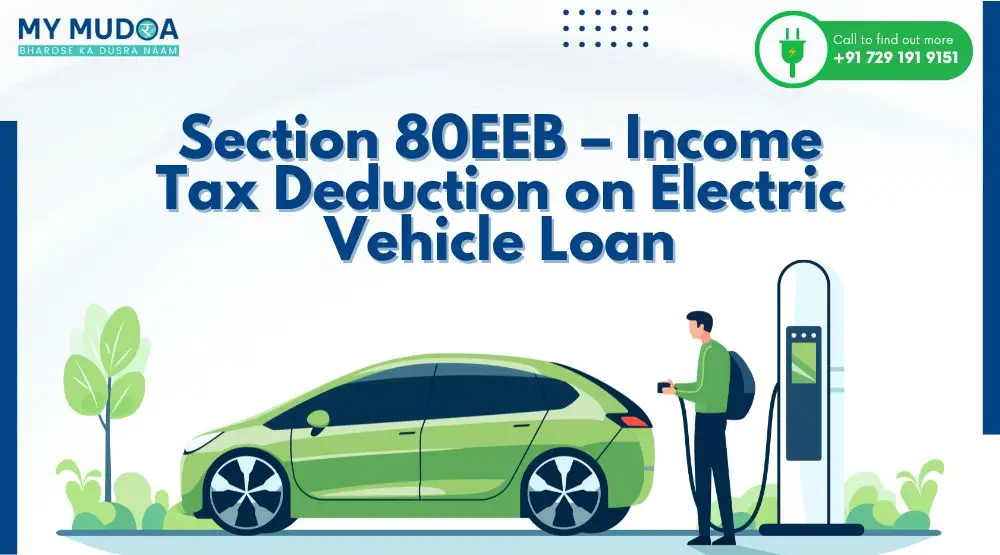
"Learn how Section 80EEB helps you save up to ₹1.5 lakh on interest for your EV loan. Check eligibility, benefits, and application details."

Published: 31 October 2025
Electric vehicles (EVs) are becoming more popular in India. To support this, the Government of India introduced Section 80EEB of Income Tax Act. This lets you get a tax deduction for the interest you pay on your loan.
So let’s explore how Section 80EEB works.
Section 80EEB was made to encourage people to buy electric vehicles. It lets you get an income tax deduction on the interest you pay for your EV loan.
If you have taken a loan to buy an EV, you can use this section to reduce your taxable income. It applies only to individual taxpayers.
You can claim electric vehicle deductions 80EEB if you meet the following conditions:
This section applies whether you are buying the EV for personal or business use, as long as the loan is in your name.
Under Section 80EEB of Income Tax Act, you can get a tax deduction of up to ₹1,50,000 every year.
An example:
|
Particulars |
Amount (₹) |
|
Total interest paid in the financial year |
₹1,70,000 |
|
Maximum deduction allowed under Section 80EEB |
₹1,50,000 |
|
Tax benefit claimed |
₹1,50,000 |
This means even if you pay more than ₹1.5 lakh as interest, you can only claim a maximum of ₹1.5 lakh under this section.
To claim the electric vehicle deductions under Section 80EEB, you must follow these steps while filing your income tax return:
If you use the EV for business, you can also claim other expenses like electricity, maintenance, and insurance separately under business expenses.
You might wonder if you can still claim the Section 80EEB deduction under the new tax regime. Unfortunately, the answer is no. Under the new tax regime, introduced in Budget 2020, you cannot claim most of the existing deductions and exemptions. It includes electric vehicle tax benefits under Section 80EEB.
However, if you want to enjoy the 80EEB deduction, you can continue under the old tax regime. It’s always good to compare both tax regimes and choose the one that gives you higher overall savings.
When you get the electric vehicle tax exemption, make sure to keep these documents ready:
These documents will help you if the tax department asks for proof during assessment.
With Section 80EEB, you get extra motivation to make the switch.
Here’s why this deduction is valuable:
By using the 80EEB electric vehicle loan benefits smartly, you can reduce your tax outgo while contributing to a greener future.
At My Mudra, you can explore loan options from top banks and NBFCs that offer competitive rates for electric vehicles.
Here’s how we support you:
My Mudra connects you with trusted lenders so that you can make informed financial decisions.
Section 80EEB of Income Tax Act helps you save tax when you buy an EV. It also promotes the use of eco-friendly transport. You can take a loan from a bank or an NBFC if you plan to buy an EV. By having the Section 80EEB deduction, you can lower your tax amount. Always compare different options so you can make the most of it.
Also Read:
- What is an Electric Vehicle Loan?
- Is Car Loan Secured or Unsecured?
Section 80EEB allows you to get a deduction of up to ₹1.5 lakh. You get this for the interest you paid on an EV loan.
Only individual taxpayers are eligible. They should have taken a loan from a recognised bank or NBFC to buy an EV. It should be done between April 2019 and March 2023.
You can get a maximum deduction of ₹1,50,000 for the interest paid on your EV loan in a year.
No, the electric vehicle tax benefit in new tax regime is not available. You can claim it only under the old regime.
You need to collect your loan interest certificate from the lender and mention the deduction amount under Chapter VI-A while filing your income tax return.
💬 Comments
Leave a comment or ask a question!
Please Enter Your Name
Please Enter Your Email
Please Enter Your Phone
Please Write Your Comment